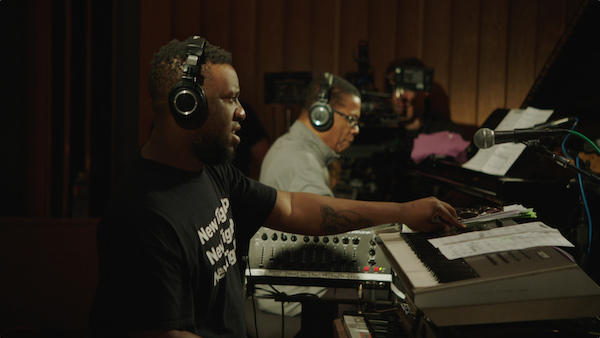Jan 13, 2026 2:09 PM
More Trump-Kennedy Center Cancellations
The fallout from the renaming of the John F. Kennedy Center for the Performing Arts to include President Donald…

Robert Glasper (foreground) and Herbie Hancock in a scene from the documentary Blue Note Records: Beyond the Notes.
(Photo: Mira Film)Swiss-born director Sophie Huber’s Blue Note Records: Beyond the Notes (Eagle Vision), which coincides with the label’s 80th anniversary, supports the canard that good things come in threes. However, the film stands in contrast to both It Must Schwing: The Blue Note Story, by Eric Friedler, a German—which portrays label co-founders Alfred Lion and Francis Wolff from the perspectives of the musicians they documented—and I Called Him Morgan, in which Kasper Collin, a Swede, traces the relationship between iconic Blue Note trumpeter Lee Morgan and the woman who shot him in 1972. Huber examines the ways in which the members of Blue Note’s hip-hop-informed 21st-century roster connect, aesthetically and emotionally, to the classic albums that established Blue Note’s indelible brand.
She frames the narrative around a beautifully shot 2017 recording session at which the “Blue Note All Stars” (Ambrose Akinmusire, Robert Glasper, Derrick Hodge, Lionel Loueke, Kendrick Scott and Marcus Strickland) join old masters Wayne Shorter and Herbie Hancock for two intuitive explorations of Shorter’s “Masqualero.” Huber interviews all of them, as well as Blue Note President Don Was, producer-alto saxophonist Terrace Martin, vocalist/pianist Norah Jones, recording engineer Rudy Van Gelder (1924–2016) and alto saxophonist Lou Donaldson, whose 23 years with Blue Note included the 1967 LP Alligator Bogaloo, which featured contributions from “hip-hop architects” (in the words of Ali Shaheed Muhammad from A Tribe Called Quest), such as guitarist George Benson, organist Dr. Lonnie Smith and drummer/groove-master Idris Muhammad.
“I knew from the beginning that I wanted to talk to the younger artists not only about what’s happening now, but to directly understand how alive the influence of the artists of the past still is,” Huber said. As examples, she mentions Scott’s account of his “conversion experience” after hearing Art Blakey on A Night At Birdland (1954), and Strickland’s paean to John Coltrane’s Blue Train (1958).
The project began in 2015, after an inquiry from Was, who’d played bass on the soundtrack to Huber’s first documentary, Harry Dean Stanton: Partly Fiction. “My dad had a lot of jazz records, and the music always intrigued and invigorated me,” she said. “But what made Blue Note different was the aesthetics.” Huber was referring to the “timeless, perfect combination” of Wolff’s distinctive photographs and Reid Miles’ album cover design, which she deploys prominently in propelling the film’s narrative flow.
“Then I discovered that Blue Note was founded by two German-Jewish refugees,” she added. “In a time when xenophobia and racism are moving to the forefront, it was important to tell a story about immigrants and African Americans who created a legacy as powerful and vital today as it was then.”
The process of winnowing down hours of footage to an 85-minute film “that would hopefully appeal to younger people, and people who don’t necessarily know much about jazz, or like it, or even know that they like it” necessitated difficult editorial decisions.
Some aficionados will question Huber’s choice to generally ignore the 1984–2010 tenure of label head Bruce Lundvall, who oversaw consequential albums by Cassandra Wilson, Dianne Reeves, Kurt Elling, Joe Lovano, Greg Osby, John Scofield, Benny Green and Jason Moran, as well as Jones, Glasper and Loueke.
“I tried to at least show an album cover, so that [many artists’] names come up,” she explained. “But I chose to be present and look into the future, rather than go into detail about the past. I hope people will be interested enough to dig deeper and find out more, as the wealth is vast.” DB

Belá Fleck during an interview with Fredrika Whitfield on CNN.
Jan 13, 2026 2:09 PM
The fallout from the renaming of the John F. Kennedy Center for the Performing Arts to include President Donald…

Peplowski first came to prominence in legacy swing bands, including the final iteration of the Benny Goodman Orchestra, before beginning a solo career in the late 1980s.
Feb 3, 2026 12:10 AM
Ken Peplowski, a clarinetist and tenor saxophonist who straddled the worlds of traditional and modern jazz, died Feb. 2…

The success of Oregon’s first album, 1971’s Music Of Another Present Era, allowed Towner to establish a solo career.
Jan 19, 2026 5:02 PM
Ralph Towner, a guitarist and composer who blended multiple genres, including jazz — and throughout them all remained…

Rico’s Anti-Microbial Instrument Swab
Jan 19, 2026 2:48 PM
With this year’s NAMM Show right around the corner, we can look forward to plenty of new and innovative instruments…

Richie Beirach was particularly renowned for his approach to chromatic harmony, which he used to improvise reharmonizations of originals and standards.
Jan 27, 2026 11:19 AM
Richie Beirach, a pianist and composer who channeled a knowledge of modern classical music into his jazz practice,…